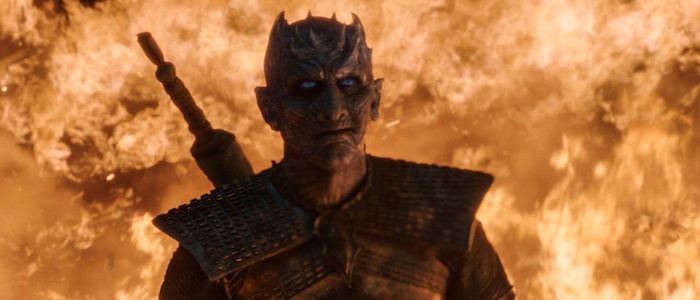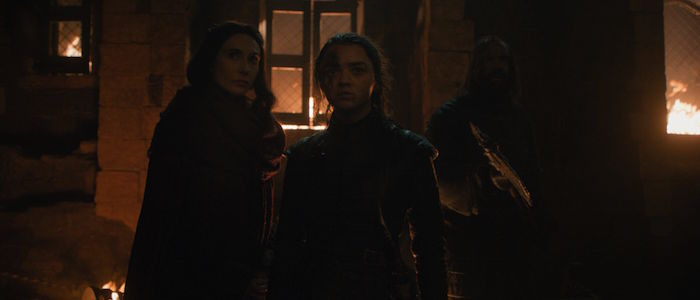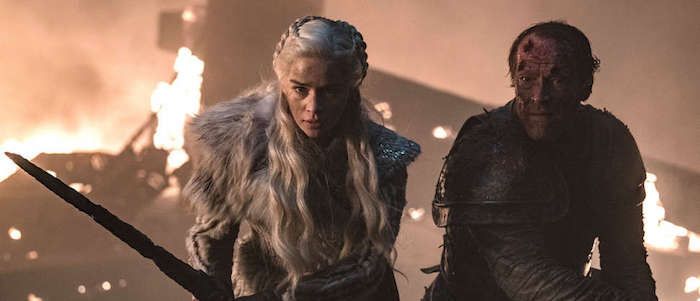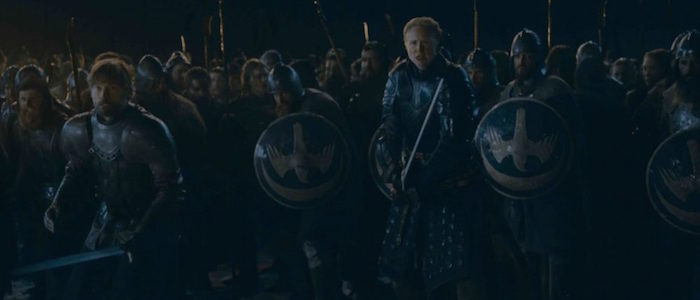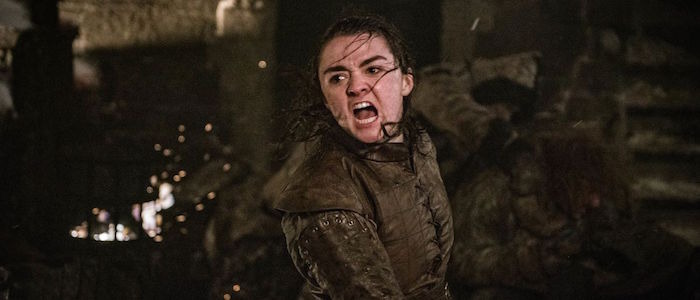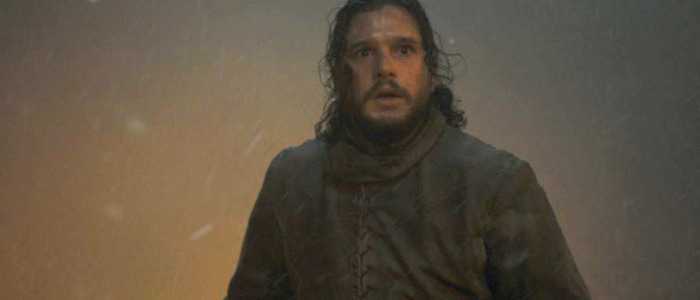'Game Of Thrones' Drops The Ball With "The Long Night," The Worst Battle In The Show's History
Here is it is. The biggest battle in Game of Thrones history. And it was a huge letdown.
But does the failure of big action mean "The Long Night" itself was a total failure? Not necessarily. Because nestled in that murky brawl were scenes of sublime beauty, unforgettable misery, and triumph that has been years in the making. Let's sort through this.
The Night is Dark and Full of Bad Editing
If you were on social media in the hours after "The Long Night" aired, you saw the complaints. You saw the memes. You saw the jokes. You saw the mockery. And you saw the anger. Game of Thrones watchers, millions of them, claimed they simply could not follow the battle at the center of the episode. Because, well, it was too dark. These reports were followed by explanations. Maybe the HBO Go servers were slammed to the point where everyone was watching a crummy stream. Maybe viewers' televisions weren't calibrated properly. Maybe it was a creative choice, one meant to capture the chaos of the battle itself.
I believe that final part to be accurate, but I also believe the episode itself was a tremendous technical failure and that this particular creative choice undermines everything the episode's director, Miguel Sapochnik, set out to do. For the record, I watched this episode on the same television on which I watched and enjoyed seasons 6 and 7, a television owned by a friend who takes his calibrations and dark levels very seriously. We watched the cable broadcast, not the stream. Darkness was still an issue. Halfway through the episode, we pressed pause to adjust the brightness because my entire group of watchers could not tell what was happening (leading to much wincing from the television owner, who noted how we were sacrificing a calibrated picture just so we could follow basic action). This has never happened before on this TV and never with a past episode of Game of Thrones.
I imagine we'll be hearing something official from HBO in the hours or days ahead as they try to control the narrative of the battle no one could see. The battle they have been talking up, hyping up, for close to a year now as the biggest action scene in history. Quite frankly, the marketing department did the episode no favors. Hype is a dangerous thing. Expectations can derail just about anything when they're aimed in the wrong direction. So let's strip away the hype. Let's strip away the expectations. If we had gone into the Battle of Winterfell completely blind, would I still be as disappointed as I am right now?
The answer is yes. The problems with this episode go beyond the choice to shoot almost the entire thing in murky shadows – there's also the choice to drop a blizzard on top of the action and then fill that blizzard with swirling dragon ash. Combined with the low light, this places all of the action in indecipherable fog. And once again, this clearly seems to be a point. The battle is staged as a horror sequence, with few moments of heroism and even fewer moments of hope. The confusion and the chaos, the fact that no one can see anything and the enemy can come from anywhere, is the point. There's no denying the intent here, and on paper, it's fine and frightening way to stage a war against the undead. And it works early on, like when countless thousands of Dothraki ride into the darkness and we watch as their flaming weapons are rapidly distinguished in the shadows. But once the proper fight begins, these chilling moments, where the darkness works in favor of the battle, fade away.
So the problem lies in execution. With visibility already limited, the action itself is cut to ribbons. Incoherent close-ups, wild camera swerves, shots that last for only a handful of frames before cutting away...clearly, the intention with the editing is to place in the audience in the action, to be a part of a battle where everything is out of control. Once again, that's fine in theory. But when combined with the lack of light and the low visibility, this leads to action that is genuinely impossible to follow.
It is the job of an editor, working with footage supplied by the production crew, to establish the geography of a scene, to let you know where everyone is and their spatial relationship to other characters. The quick-cutting means not knowing whether a dragon is alive or dead. It means not realizing Beric survived his wounds until he suddenly joins other characters in another room. It means having to tell your friend when the credits roll that yes, Gendry actually survived and that was another guy who plummeted to his death, but the quick cutting suggested the incorrect information. Ultimately, the episode's attempts to create chaos result in actual, unwatchable chaos, 90 minutes of television that are bizarrely incompetent for a series that has otherwise been so magnificently shot for nearly a decade.
Sapochnik himself is no stranger to delivering the series' trademark spectacle – his "Battle of the Bastards" and "Hardhome" are examples of all of this done right. However, those fights have the benefit of taking place in the daylight, where the fast cutting is assisted by by the mere fact that we can see faces and know who we are looking at.
I'm reminded of a quote from Lord of the Rings cinematographer Andrew Lesnie, who was asked where the light was coming from during one scene. His response: "Same place as the music." Sometimes, a cinematic recreation of a concept is better than an attempt to actually create that very thing. It's possible to stage chaos. It's possible to stage chaos and place an audience in it and allow us to understand what we're looking at. But I wish Game of Thrones knew what Lesnie knew: telling a clear story is the reason we're all here in the first place and that should always be the number one priority.
What Are We Fighting For?
Let's pretend for a moment that "The Long Night" was as well-lit and well-edited as previous battles on Game of Thrones. Will the battle itself still measure up against the likes of the Battle of Blackwater, the Battle of the Bastards, and Daenerys' assault on the Lannister caravan? Quite frankly, no. Each of those fights were huge, yes, but they also were more than characters swinging swords for 90 minutes. Blackwater placed us on both sides of the conflict, made clear the tactics and goals of each side, and then let us simmer as we watched those plans evolve on the battlefield, adapt as each commander out-maneuvered the other. The Battle of the Bastards is a fight where everyone going in has a clear plan, only for everything to not go according to plan, forcing us to suffer alongside the heroes as their strategy fails spectacularly. Daenerys' assault is rightfully told from the point of view of Jamie and Bronn, and the action revolves around their attempts to survive a perfect ambush, to rally and communicate in the face of overwhelming odds.
What is the actual plan at the Battle of Winterfell? We never hear Jon or Dany shout any orders. Other than a quick signal flare, Davos just hangs out on the top of a wall. Grey Worm seems to be improvising. Everyone else just stands in their flank before quickly retreating. The entire battle for the seven kingdoms seems to be built on the idea of "Well, we'll gather here and hope for the best." In a series that has so often luxuriated on the details of military warfare, that delights in smart minds playing the battlefield to their specific advantages, this is not good enough. It could be argued that this is a battle run by green commanders who don't have much experience, but Tyrion, Jon, Daenerys, Davos, and Grey Worm are all seasoned at this point. They've survived too much and know too much. The incompetence from competent characters is genuinely shocking.
At the very least, I hope the show recognizes and points out Jon's increased uselessness as a field commander – following Hardhome and the Battle of the Bastards, this is the third major battle he's personally lost, and the second that was only won at the last second because someone more competent showed up. But at least his incompetence is a character trait and something we've come to expect. The rest of the episode reduces Brienne, Jaime, Tormund, Gendry and the rest of the crew to glorified extras, putting their backs against walls and letting them endlessly hack zombies to death for the back 45 minutes of the episode, never changing geography, never using Winterfell's multiple levels to their advantage, and never varying up the monotony of it all. Thank the Seven for the crypt, where we could occasionally cut to escape the repetitive, character-free nonsense in the courtyard. My kingdom for these characters sharing a glance, a moment, anything, during the worst night of their lives. (A handful of characters are excepted from this, and we'll get there.)
So, other than that, how was the play, Mrs. Lincoln? You know what? Not that bad. When the chaos takes a break, "The Long Night" is actually a damn solid episode of Game of Thrones painfully stretched around a lousy battle.
Deus Ex Melisandre
In a surprise reveal, Melisandre makes good on her promise to return to the north one final time. And just in time, too. Without the red priestess, the battle would've been lost. She ignites the blades of the Dothraki. She sets the trench on fire when the Night King uses a blizzard to keep Daenerys from getting it done with dragonfire. And most importantly, she gives a pep talk to Arya Stark at just the right moment, letting the youngest Stark girl save the day and complete an arc that has been brewing since early in season 1.
In many ways, Melisandre's role in this episode is that of a deus ex machina, with her arriving out of the blue to save the day and make everything right. But this is a case where I'll allow it. Here is a woman who can see the future in the flames, a powerful sorceress who has dedicated her life to stopping the undead from destroying the world of the living. Of course she would be here. Of course she would defy Jon Snow's banishment to fulfill her destiny. And of course her destiny isn't quite what she, and we, thought it would be.
When we first met Melisandre back in season 2, she was working for Stannis Baratheon, convinced that the charisma-free stick-in-the-mud was the Lord of Light's chosen one, Azor Ahai, the prince who was promised. That ended when Stannis lost his head. Then she thought Jon was the man for the prophecy. Across the narrow sea, some thought it was Daenerys. Some of the character's best moments, and some of Carice Van Houten's best work, arose from Melisandre realizing that her visions had failed her. That her god has seemingly left her alone in the dark.
"The Long Night" quietly adds context to what we already knew. Melisandre knew this fight was coming. She knew she had to be there, at the side of Azor Ahai, to save the world from darkness. But she didn't know whose side she had to stand by. How could she have known that her most important job, the act that saves an entire continent, is to remind young Arya Stark of her very first lesson from her very first teacher?
We've seen Melisandre powerful and we've seen her humbled. And now, we see her victorious. And the man who hates her the most, Davos, watches as she steps beyond the gates of Winterfell, removes her enchanted broach, and dies the old woman she has been all along. Her watch is ended. Her mission is accomplished. She has done her duty, leaving many innocent bodies and plenty of mistakes in her wake. Now she can rest...and we have to grapple with her complex, bloody legacy.
A Moment for the Dead
Here's the thing: the good guys lose the Battle of Winterfell. Straight-up. Their armies are decimated. Their defenses fail. Everyone and everything is over. It's only through a last-minute assassination that the day is won. We'll get there. First, we need to talk about who didn't make it to sunrise.
"Dolorous" Edd Tollett, Lord Commander of the Night's Watch and one of Jon and Sam's oldest friends. Stabbed in the back by a wight early in the battle. His legacy is one of grim humor and steadfast loyalty, the unlikely ally who has your back no matter how difficult things looked. We knew he was a goner the moment he rode into Winterfell last episode, but his death reflects a hard truth: with the exception of Jon and Sam, the O.G. The Wall crew is now completely dead.
We didn't get to know Lyanna Mormont too well, but we loved her nonetheless. The pint-sized leader of House Mormont took her duties seriously, proving herself to be a more effective commander of men than most grown adults in Westeros. After stealing scenes for several seasons, she was crushed by an undead giant, but not before taking the beast down with her. Perhaps a slightly obvious death, but a heroic and noble one nonetheless. They'll sing songs of her bravery.
Beric Dondarrion has been a dead man walking since season 3, when we learned that he has died several times and has almost been resurrected by Thoros of Myr. But the leader of the Brotherhood Without Banners, who was first introduced in a non-speaking role back in season 1 (where he was played by a different actor) met his final and brutal end during the battle of Winterfell: stabbed a whole bunch by zombies. Not the most pleasant way to go out, but this has never been a pleasant show. At least his flaming sword allowed his scenes to be better lit than the rest. Zing.
The death of Theon Greyjoy may be the least surprising aspect of "The Long Night," but that doesn't make it any less moving. The man who betrayed his adoptive House and and family, and had his mind, body, and soul forced through a meatgrinder for his efforts, returned to Winterfell to atone, to defend the boy he once betrayed, the castle he overthrew, and the family he tore apart. While Theon's storyline has seen its highs and lows over the years, there's no denying Alfie Allen's tremendous work and there's no denying the power of watching a character who has been around since the original pilot being struck down and killed. The series offers him redemption, which he may or may not have earned. That's a conversation for another day. But Bran Stark offers him acceptance, which is all he ever wanted.
Of course, Theon's death was quickly avenged, as The Night King himself was struck down in the final minutes of the episode, ending the undead invasion that was set up in the first scene of the first episode and causing every one of his soldiers to collapse in a heap. It's hard to eulogize a villain whose entire purpose was to be the bleakest, most evil supernatural force imaginable just so he could contrast with the various shades of grey assembled to beat him, but hey, he was one scary dude. And one of the best moments in "The Long Night" came when we just casually resurrected every dead man on the battlefield to get Jon Snow off his back. He went down doing what he loved best: making everyone around him have a very bad day.
Finally, we come to the most heartbreaking death of the battle: Jorah Mormont. Another regular since the first episode, the exiled knight has spent the past eight seasons fighting for Daenerys, pledged to defend her at all costs. And he paid the ultimate price. He stood his ground, holding back the undead hordes who were rushing the grounded and dragon-less Daenerys, accumulating wound after wound, but staying on his feet. It's only when the undead army falls that he does the same, dying in the arms of his beloved Khaleesi. No dying words. No final expression of love. Just a disgraced knight, having found something worth dying for and living up to that promise. (It's worth noting that with the deaths of Lyanna and Jeor, House Mormont is effectively destroyed at this point.)
A Moment for the Living
Perhaps the most surprising element of "The Long Night" is how many people didn't die. Sure, Jon and Dany have enough plot armor to deflect Valyrian steel, but seemingly expendable characters like Brienne, Tormund, Podrick, Gendry, Grey Worm, the Hound, Samwell, and more stayed alive, even under increasingly improbable circumstances. This leads to a tale of two conflicting reactions.
Reaction Number One: Game of Thrones realized that in an episode that featured great swaths of the North being wiped from existence, we should be allowed some survivors we love and cherish to help us through the back half of the season. All of these characters are "fan favorites," with many of them seemingly having increased roles in recent years because the audience has responded to them with such enthusiasm. Seriously, Tormund doesn't actually add anything to the plot these days, but god damn it, it sure is good to see him hanging around. I'm happy that Game of Thrones let these folks live. I'm happy to spend more time with characters who are allowed to simply exist in this world. I'm glad people I love, albeit fictional people, live on.
Reaction Number Two: Game of Thrones has gone a bit soft, huh? This is the same show that cut off Ned Stark's head and butchered Robb Stark at a wedding and shot Tywin Lannister through the bowels while he was taking a shit and crushed Oberyn Martell's skull. And yet, it now has a big enough heart to let Brienne and Tormund and freakin' Podrick walk away from the biggest and bloodiest battle in Westerosi history unscathed? You've changed, Game of Thrones. You used to be ruthless. You used to break our hearts. You used to not care how much we loved someone before you bashed them to pieces. This all started back when you let too many people survive in "Beyond the Wall" and now it's become a bad habit. Where has your nerve gone? Why aren't you killing the people I love?
Yes, these two reactions don't quite gel. I know. It's silly. But as we charge toward the ending, these characters need to find meaning in the homestretch – I'd rather a character I love die in a way that matters than live on just because we like them. And I can't help but be concerned that some folks have been granted armor just because we like them a bunch, not because them surviving serves the story. We shall see.
Not Today
I think we'll be talking about "The Long Night" for, well, a long time. It's a massive episode, one built around a giant battle that feels like a failure even as it populates that battle with moments that are wonderful and sad and earned. But here's the question to ask: is suffering through all those lousy action scenes worth it to watch Tyrion and Sansa hold hands in the crypts as they recognize their connection in the face of death? Yes. Completely. Game of Thrones failed as spectacle here, but it succeeded where it truly mattered: it gave us the character moments, the relationships, and personal revelations, that make that spectacle actually feel like it's supposed to matter in the first place.
And it all comes down to Arya Stark and the completion of her personal journey. Back in season 1, when Arya was just a young, plucky kid with a thirst for adventure and not a trained assassin, her "dancing master" taught her a most important lesson. "What do we say to the god of death?" Syrio Forel asked the Stark girl. "Not today." And for eight seasons, Arya has been saying "not today" to death on a constant basis. She said it as she fled the Lannister takeover of King's Landing. She said it as she was held captive in Harrenhal. She said it was she was abducted by Sandor Clegane and she said it as she narrowly escaped the Red Wedding and embarked on her voyage to Braavos. She said it as she mastered the art of killing, as she returned home and had her revenge. She said it as she saved her family from the machinations of Littlefinger alongside Sansa. Arya has learned a great deal: trust no one, fight dirty, stick 'em with the pointy end. But this first lesson, to say "not today" in the face of death, is the one that matters.
What is The Night King if not the very personification of death itself? He certainly doesn't have a personality and his goals are straightforward enough: he wants to wipe out all living things. As Samwell pondered last week, death is forgetting and The Night King is out to annihilate just human beings, but the very history of Westerosi civilization. He wants everything and everyone to be simply forgotten.
Arya has tried to forget. She tried to forget she was a Stark so she could train at the House of Black and White. She tried to let go of her past, and the memories of those who destroyed her life and her family, so she could move on. But Arya Stark does not forget. And how could she? She is the master of death. Not just because she can swing a blade like no one else, but because there is no one else on Game of Thrones to whom memory matters more. Arya's list of names, the list of people she wants to kill, is rivaled only by the list of people who have made her the woman she is today. Ned Stark, Jon Snow, Catelyn Stark, Syrio Forel, Jaqen H'ghar, Gendry, Sandor Clegane, Brienne of Tarth. A girl's memory is long. A girl's memory is sharp. A girl stares death, and the all that comes with it, in the face and says "Not today" one more time as she plunges a dagger into the chest of The Night King, defeating death itself and preserving the lives of those she loves and those she'll know.
Final Thoughts
It's frustrating that an episode with so many sublime moments was hijacked by the worst large-scale battle in the show's history. It's frustrating that we'll be spending the next week talking about brightness levels on televisions instead of Jorah's sacrifice, Theon's final moments, and Arya's journey from her first fencing lesson to defeating The Night King. I'm never going to forgive "The Long Night" for being some of the sloppiest 90 minutes of television I've ever seen on HBO, but I'm never going to forget its best moments.
With the undead defeated, Game of Thrones can now return to the final battle against Cersei Lannister. I hope we get some politics. I hope we get some treachery. I hope they hold back on the massive armies and remember that this show was built on intrigue and character before spectacle. I hope.

